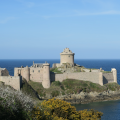CHÂTEAU DE LA ROCHE GOYON - FORT LA LATTE
An incomparable, virtually impregnable fort that transports us back in time, it has been pillaged and almost ravaged, except for the keep.
This old feudal castle, built of pink sandstone, stands on a rocky spur jutting out into the sea. Fort la Latte, also known as Château de la Roche Goyon, is an incomparable site that transports you back in time. Built in the 14th century, this virtually impregnable fortress, repeatedly besieged, belonged to the Goyons, one of Brittany's oldest families. In the 16th century, the Ligueurs stormed the castle and managed to gain entry. It was looted and almost entirely destroyed, with the exception of the keep. Transformed into a coastal defense fort between 1690 and 1715, its protective system is still in place: curtain walls, towers, walls, drawbridges, dungeons and keep have survived the centuries. Gradually abandoned during the 19th century, it was declassified in 1890 and sold by the Domaines in 1892. It was largely in ruins when it was classified as a historic monument in 1925. Restored since 1931 by the Joüon des Longrais family, it has been used as a set for a number of film shoots: Les Vikings with Kirk Douglas, Philippe de Broca's Les Chouans and, more recently, the video clip for the song La tribu de Dana, by the group Manau, and the film Les Trois Mousquetaires (2023)! Today, it's one of the most visited castles in Brittany. Children will love exploring its nooks and crannies, guardhouse and keep. From up there, you'll enjoy breathtaking panoramic views of the entire Emerald Coast! Also worth noting: the fort usually hosts a medieval festival in early August.
Did you know? This review was written by our professional authors.
The strengths of this establishment:
Book the Best Activities with Get Your Guide
Members' reviews on CHÂTEAU DE LA ROCHE GOYON - FORT LA LATTE
The ratings and reviews below reflect the subjective opinions of members and not the opinion of The Little Witty.
Find unique Stay Offers with our Partners







Il marque juste une explication du point de vue pour situer les petites îles et la côte.